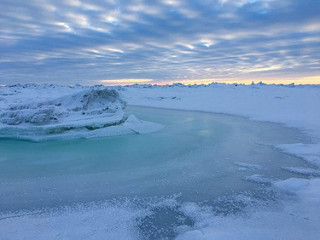

Nome, Alaska, had back-to-back blizzards followed by rain, ending a February that saw temperatures in the upper 20s or low 30s. When the rain hit the snow, it turned into ice, which made the roads so treacherous that even taxis stopped running. The National Weather Service reported Nome got 76 inches of snow between Jan. 25 and Feb. 28. Since Nome is just 143 miles south of the Arctic Circle, rain and warm temperatures are unusual.
A single weather event may or may not be caused by global warming. But when you add the facts that the whole eastern half of the Bering Sea is ice-free, that its water temperature is 3 degrees warmer than usual; that Kotzebue Bay, a shallow arm of the Bering, is not frozen solid; that the Grand Iditarod Dog Race, a famous, 1,000-mile race from Anchorage to Nome, is building temporary bridges to cross water south of Nome; and that this latest unusual weather pattern is at least 2 years old — the only reasonable explanation of all these facts is global warming. Inuit elders began noticing warming signs in the 1980s.
Nome, a fly-in community since it is not connected to the rest of Alaska by road, is a hub for a number of smaller communities because it receives freight by barge. It’s only a hundred or so years old, the result of an early 20th century gold rush, with just under 3,700 people according to Mayor Richard Beneville. It is about 65 percent Inuit, with communities from the Inupiaq, Central Yupik and St. Lawrence Island peoples.
Unlike a number of Alaska’s municipalities, Nome is not a dry (alcohol-free) town, and it has a former substance abusers’ support group that meets weekly in the Katirik Cultural Center. A fluctuating group of homeless people hangs out in front of the bars on Front Street. The religious radio station KNOM reports that a new shelter has been set up to allow homeless people who were sleeping in snow banks to sleep under a roof. (tinyurl.com/y4rble8s)
With the beginning of what could be substantial trade between Europe and Asia using the Northwest Passage, there are capitalist dreams about turning Nome into a very profitable service port. This would require more investment, major dredging and workers used to living in an exacting environment.
Over 6 feet of snow, topped with ice, creates major difficulties for workers who have to drive or walk to their jobs and for students who take a bus to school. Open water in the Bering Sea makes it very difficult to harvest sea mammals and fish that people in Nome, especially Native people, depend on for sustenance. It also opens their communities to flooding and erosion from winter storms.
Hunting for sustenance is important for Alaskans. It is the only state where the federal SNAP program (formerly the food stamp program) allows its benefits to be used to purchase tools for harvesting wild animals. The tools include “nets, lines, hooks, fishing rods, harpoons, knives and ice augers.”
But without ice, people can’t go ice fishing. Harvesting seals, a major food resource, is much harder when you have to tow them to land. The hunters who catch walruses (mammals that grow to between 2,000 and 3,000 pounds) have to process their catch 50 miles offshore in an open boat — much more difficult and dangerous than towing their catch a few miles to ice and processing it on a stable platform.
Global warming is making the hard lives of people living on the Alaska coastline, some in whaling communities like Utqiaġvik that are close to 1,000 years old, much harder.
This statement was recently issued by over 30 groups. On Friday, March 28, Dr. Helyeh…
When Donald Trump announced massive tariffs on foreign imports April 2, Wall Street investors saw…
The century-long struggle to abolish the death penalty in the U.S. has been making significant…
Download the PDF May Day appeal to the working class Revolutionary change is urgent! Gaza…
Philadelphia On March 26, the Pennsylvania Supreme Court denied political prisoner Mumia Abu-Jamal permission to…
There are two important and overlapping holidays on April 22: Earth Day and Vladimir Lenin’s…